Uses
This medication is used to treat certain mental/mood disorders (such as schizophrenia, psychotic disorders). Trifluoperazine belongs to a class of drugs known as antipsychotics. It works by helping to restore the balance of certain natural substances in the brain.
How to use Trifluoperazine HCL
Take this medication by mouth with or without food as directed by your doctor, usually once or twice daily.
The dosage is based on your medical condition, age, and response to treatment. In children, the dosage is also based on weight. To reduce your risk of side effects, your doctor may direct you to start this medication at a low dose and gradually increase your dose. Follow your doctor's instructions carefully.
Take this medication regularly to get the most benefit from it. To help you remember, take it at the same time(s) each day.
Although you may notice some medication effects soon after starting, it may take 2 to 3 weeks before you get the full benefit of this drug.
Do not stop taking this medication without consulting your doctor. Some conditions may become worse when this drug is suddenly stopped. Also, you may experience symptoms such as upset stomach, nausea, vomiting, dizziness, and shakiness. To prevent these symptoms while you are stopping treatment with this drug, your doctor may reduce your dose gradually. Consult your doctor or pharmacist for more details. Report any new or worsening symptoms right away.
Tell your doctor if your condition does not improve or if it worsens.
Side Effects
Drowsiness, dizziness, lightheadedness, dry mouth, blurred vision, tiredness, constipation, weight gain, and trouble sleeping may occur. If any of these effects last or get worse, tell your doctor or pharmacist promptly.
Dizziness and lightheadedness can increase the risk of falling. Get up slowly when rising from a sitting or lying position.
Tell your doctor right away if any of these side effects occur: muscle spasm/stiffness, shaking (tremor), restlessness, mask-like expression of the face, drooling/trouble swallowing, or shuffling walk. Your doctor may prescribe another medication to decrease these side effects.
Remember that this medication has been prescribed because your doctor has judged that the benefit to you is greater than the risk of side effects. Many people using this medication do not have serious side effects.
Tell your doctor right away if you have any serious side effects, including: difficulty urinating, decreased cough reflex, swelling of the feet/ankles, butterfly-shaped rash on nose and cheeks, joint pain, skin discoloration, eye/vision changes, feeling unusually cold or hot, signs of liver problems (such as nausea that doesn't stop, yellowing eyes/skin, vomiting, stomach/abdominal pain), signs of infection (such as sore throat that doesn't go away, fever), easy bruising/bleeding, signs of anemia (such as severe tiredness, fast breathing, pale skin, fast heartbeat), mental/mood changes (such as worsening psychosis, unresponsive/catatonic state).
Rarely, this medication may cause face/muscle twitching and uncontrollable movements (tardive dyskinesia). In some cases, this condition may be permanent. Tell your doctor right away if you develop any uncontrollable movements such as lip smacking, mouth puckering, tongue thrusting, chewing, or unusual arm/leg movements.
In rare cases, trifluoperazine may increase your level of a certain chemical made by the body (prolactin). For females, this increase in prolactin may result in unwanted breast milk, missed/stopped periods, or difficulty becoming pregnant. For males, it may result in decreased sexual ability, inability to produce sperm, or enlarged breasts. If you develop any of these symptoms, tell your doctor right away.
Rarely, males may have a painful or prolonged erection lasting 4 or more hours. If this occurs, stop using this drug and get medical help right away, or permanent problems could occur.
Get medical help right away if you have any very serious side effects, including: slowed breathing, chest pain, seizures.
This medication may rarely cause a very serious condition called neuroleptic malignant syndrome (NMS). Get medical help right away if you have any of the following symptoms: fever, muscle stiffness/pain/tenderness/weakness, severe tiredness, severe confusion, sweating, fast/irregular heartbeat, dark urine, signs of kidney problems (such as change in the amount of urine).
A very serious allergic reaction to this drug is rare. However, get medical help right away if you notice any symptoms of a serious allergic reaction, including: rash, itching/swelling (especially of the face/tongue/throat), severe dizziness, trouble breathing.
This is not a complete list of possible side effects. If you notice other effects not listed above, contact your doctor or pharmacist.
In the US -
Call your doctor for medical advice about side effects. You may report side effects to FDA at 1-800-FDA-1088 or at www.fda.gov/medwatch.
In Canada - Call your doctor for medical advice about side effects. You may report side effects to Health Canada at 1-866-234-2345.
Warnings
There may be a slightly increased risk of serious, possibly fatal side effects (such as heart failure, fast/irregular heartbeat, pneumonia) when this medication is used by older adults with dementia. This medication is not approved for the treatment of dementia-related behavior problems. Discuss the risks and benefits of this medication, as well as other effective and possibly safer treatments for dementia-related behavior problems, with the doctor.
Precautions
Before taking trifluoperazine, tell your doctor or pharmacist if you are allergic to it; or to other phenothiazines (such as chlorpromazine, perphenazine); or if you have any other allergies. This product may contain inactive ingredients, which can cause allergic reactions or other problems. Talk to your pharmacist for more details.
Before using this medication, tell your doctor or pharmacist your medical history, especially of: liver problems, kidney problems, heart problems (such as mitral valve insufficiency, abnormal heart rhythm, angina), low blood pressure, blockage of the intestines, glaucoma, seizures, enlarged prostate, breathing problems (such as severe asthma, emphysema, lung infections), blood disorders (such as bone marrow depression, low red/white/platelet blood cell counts), low levels of calcium in the blood, dehydration, breast cancer, brain disorder/tumor/injury, exposure to organophosphate insecticides, pheochromocytoma, drug/alcohol/substance abuse, Parkinson's disease.
This drug may make you dizzy or drowsy or blur your vision. Alcohol or marijuana (cannabis) can make you more dizzy or drowsy. Do not drive, use machinery, or do anything that needs alertness or clear vision until you can do it safely. Avoid alcoholic beverages. Talk to your doctor if you are using marijuana (cannabis).
Before having surgery or imaging procedures (such as certain X-rays, CT scans) requiring the use of contrast dye (such as metrizamide), tell your doctor or dentist that you are using this medication and about all the products you use (including prescription drugs, nonprescription drugs, and herbal products).
This medication may make you more sensitive to the sun. Limit your time in the sun. Avoid tanning booths and sunlamps. Use sunscreen and wear protective clothing when outdoors. Tell your doctor right away if you get sunburned or have skin blisters/redness.
This medication may make you sweat less, making you more likely to get heat stroke. Avoid doing things that may cause you to overheat, such as hard work or exercise in hot weather, or using hot tubs. When the weather is hot, drink a lot of fluids and dress lightly. If you overheat, quickly look for a place to cool down and rest. Get medical help right away if you have a fever that does not go away, mental/mood changes, headache, or dizziness.
Children may be more sensitive to the side effects of this drug, especially uncontrolled movements. They may be at greater risk when they are sick (such as having viral infection, dehydration).
Older adults may be more sensitive to the side effects of this drug, especially dizziness, lightheadedness, drowsiness, confusion, uncontrollable movements, constipation, difficulty urinating, or blurred vision. Dizziness, lightheadedness, drowsiness, and confusion can increase the risk of falling.
During pregnancy, this medication should be used only when clearly needed. Babies born to mothers who have used this drug during the last 3 months of pregnancy may rarely develop symptoms including muscle stiffness or shakiness, drowsiness, feeding/breathing difficulties, or constant crying. If you notice any of these symptoms in your newborn especially during their first month, tell the doctor right away.
Since untreated mental/mood problems (such as schizophrenia, psychotic disorders) can be a serious condition, do not stop taking this medication unless directed by your doctor. If you are planning pregnancy, become pregnant, or think you may be pregnant, immediately discuss with your doctor the benefits and risks of using this medication during pregnancy.
This medication passes into breast milk. Consult your doctor before breastfeeding.
Interactions
Drug interactions may change how your medications work or increase your risk for serious side effects. This document does not contain all possible drug interactions. Keep a list of all the products you use (including prescription/nonprescription drugs and herbal products) and share it with your doctor and pharmacist. Do not start, stop, or change the dosage of any medicines without your doctor's approval.
Some products that may interact with this drug include: guanethidine, lithium, phenytoin, warfarin.
Tell your doctor or pharmacist if you are taking other products that cause drowsiness or may slow your breathing including alcohol, marijuana (cannabis), antihistamines (such as cetirizine, diphenhydramine), drugs for sleep or anxiety (such as alprazolam, diazepam, zolpidem), muscle relaxants, and opioid pain relievers (such as codeine).
Check the labels on all your medicines (such as allergy or cough-and-cold products) because they may contain ingredients that cause drowsiness. Ask your pharmacist about using those products safely.
This medication may interfere with certain lab tests (such as phenylketonuria tests), possibly causing false test results. Make sure lab personnel and all your doctors know you use this drug.
Overdose
If someone has overdosed and has serious symptoms such as passing out or trouble breathing, call 911. Otherwise, call a poison control center right away. US residents can call 1-800-222-1222. Canada residents can call 1-844-764-7669. Symptoms of overdose may include: severe drowsiness/deep sleep, loss of consciousness, agitation, restlessness, seizures, irregular heartbeat.
Do not share this medication with others.
Lab and/or medical tests (such as liver function, blood counts, eye exams) should be done while you are taking this medication. Keep all medical and lab appointments. Consult your doctor for more details.
If you miss a dose, take it as soon as you remember. If it is near the time of the next dose, skip the missed dose. Take your next dose at the regular time. Do not double the dose to catch up.
Store at room temperature away from light and moisture. Do not store in the bathroom. Keep all medications away from children and pets.
Do not flush medications down the toilet or pour them into a drain unless instructed to do so. Properly discard this product when it is expired or no longer needed. Consult your pharmacist or local waste disposal company.
Images
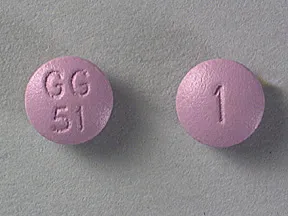
trifluoperazine 1 mg tablet
Color: lavenderShape: roundImprint: GG 51 1This medicine is a lavender, round, film-coated, tablet imprinted with "GG 51" and "1".
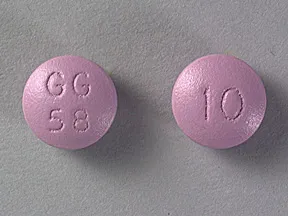
trifluoperazine 10 mg tablet
Color: lavenderShape: roundImprint: GG 58 10This medicine is a lavender, round, film-coated, tablet imprinted with "GG 51" and "1".
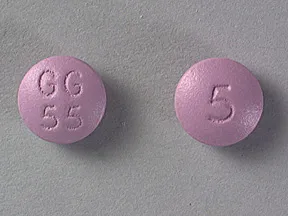
trifluoperazine 5 mg tablet
Color: lavenderShape: roundImprint: GG 55 5This medicine is a lavender, round, film-coated, tablet imprinted with "GG 51" and "1".
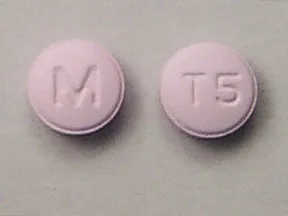
trifluoperazine 5 mg tablet
Color: lavenderShape: roundImprint: M T5This medicine is a lavender, round, film-coated, tablet imprinted with "GG 51" and "1".

trifluoperazine 1 mg tablet
Color: whiteShape: roundImprint: M T3This medicine is a lavender, round, film-coated, tablet imprinted with "GG 51" and "1".
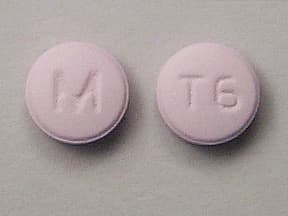
trifluoperazine 10 mg tablet
Color: lavenderShape: roundImprint: M T6This medicine is a lavender, round, film-coated, tablet imprinted with "GG 51" and "1".

trifluoperazine 2 mg tablet
Color: lavenderShape: roundImprint: GG 53 2This medicine is a lavender, round, film-coated, tablet imprinted with "GG 51" and "1".
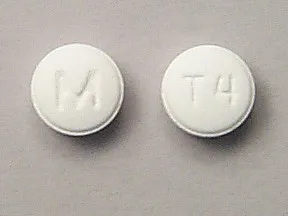
trifluoperazine 2 mg tablet
Color: whiteShape: roundImprint: M T4This medicine is a lavender, round, film-coated, tablet imprinted with "GG 51" and "1".
Are you currently using Trifluoperazine HCL?
This survey is being conducted by the WebMD marketing sciences department.
Selected from data included with permission and copyrighted by First Databank, Inc. This copyrighted material has been downloaded from a licensed data provider and is not for distribution, except as may be authorized by the applicable terms of use.
CONDITIONS OF USE: The information in this database is intended to supplement, not substitute for, the expertise and judgment of healthcare professionals. The information is not intended to cover all possible uses, directions, precautions, drug interactions or adverse effects, nor should it be construed to indicate that use of a particular drug is safe, appropriate or effective for you or anyone else. A healthcare professional should be consulted before taking any drug, changing any diet or commencing or discontinuing any course of treatment.